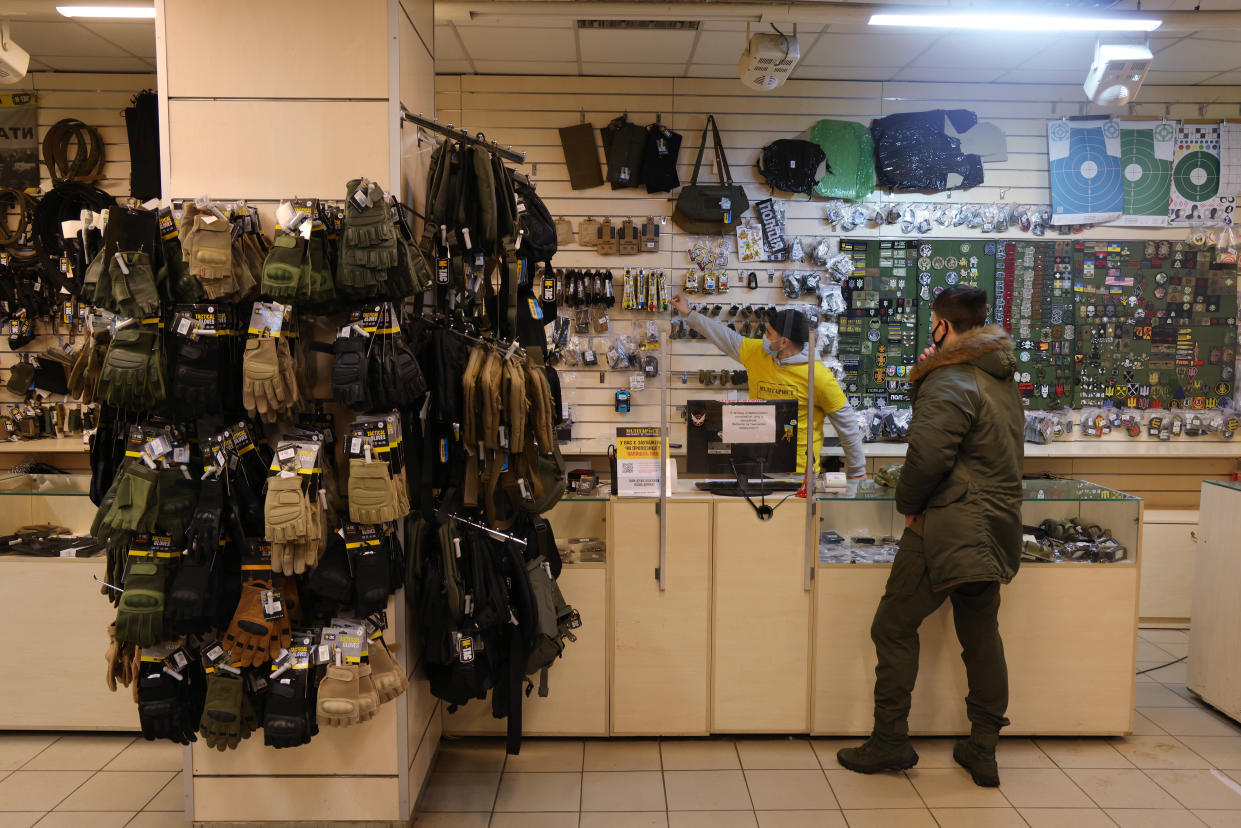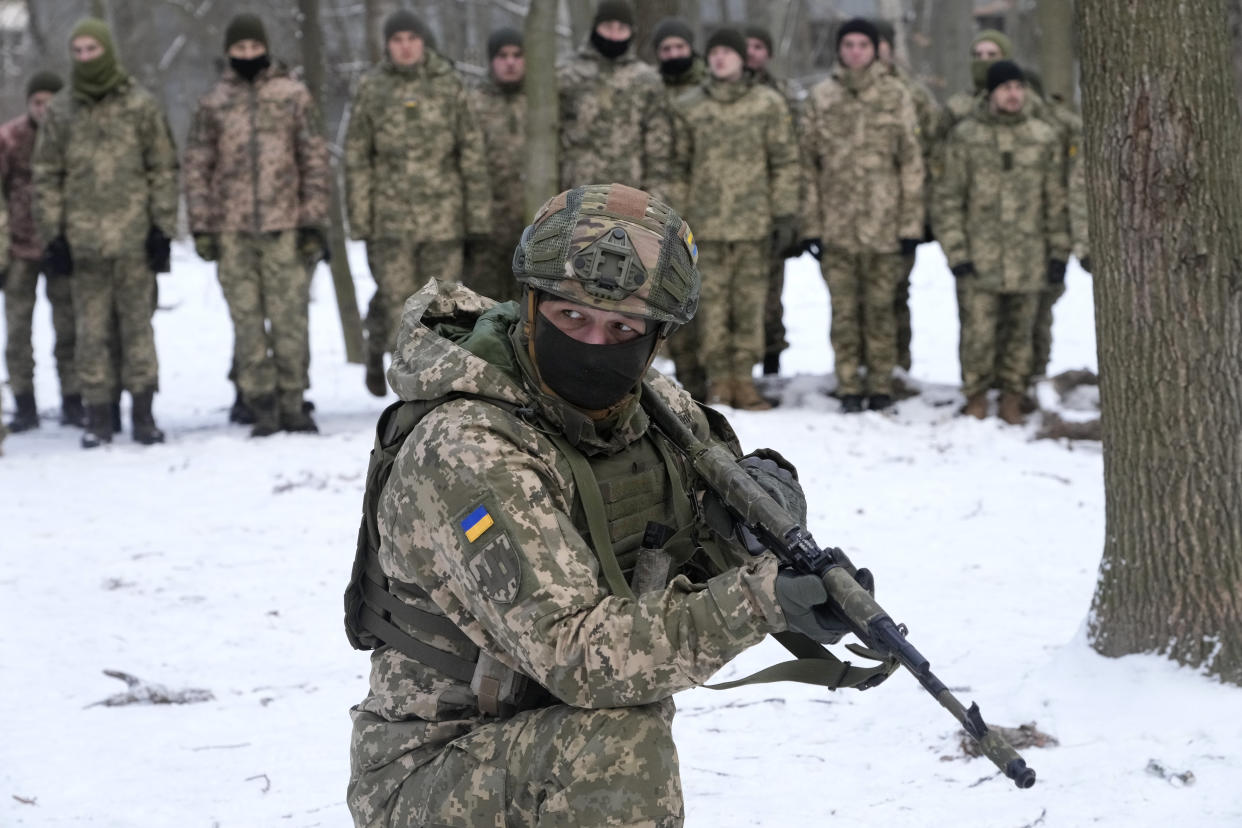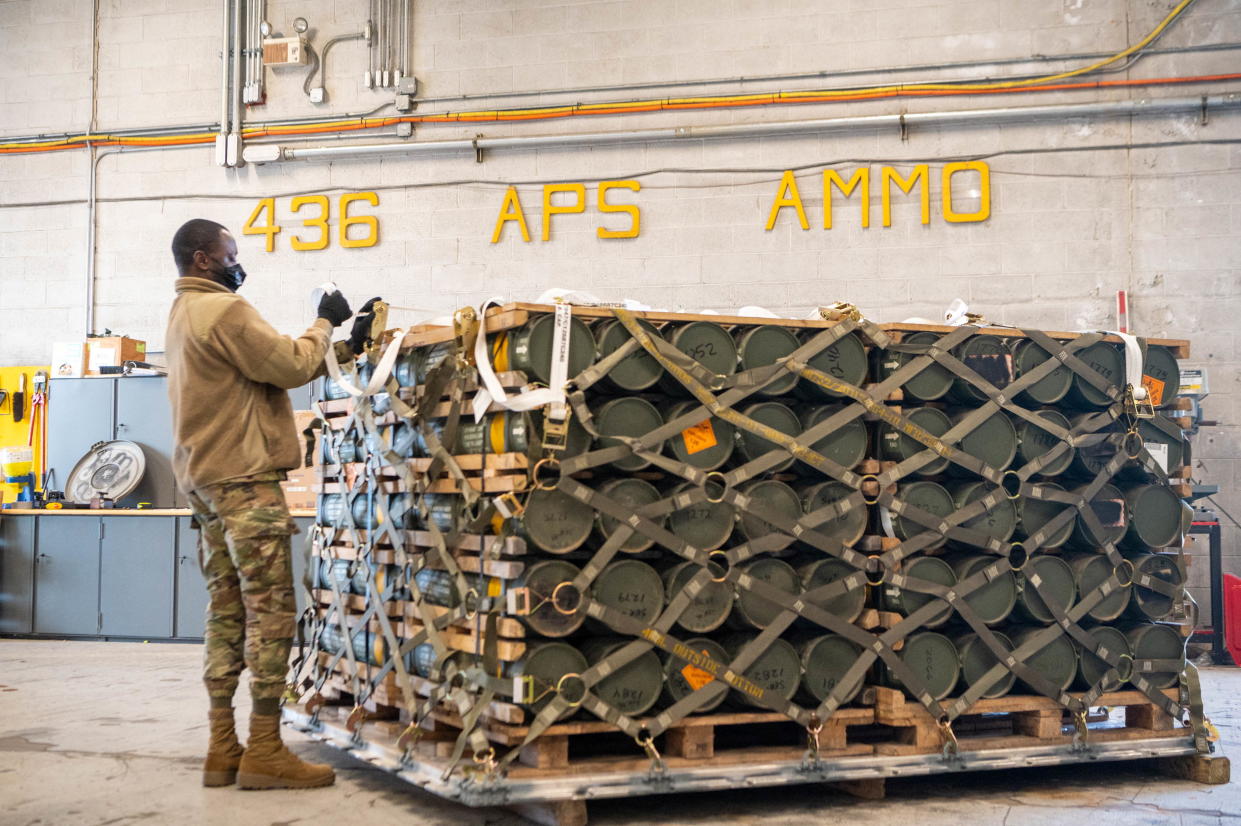Ukrainians start to grapple with warnings that a Russian invasion is imminent
Fearing that a Russian invasion of Ukraine is imminent, the U.S. State Department on Sunday ordered all nonessential personnel at its embassy in Kyiv to evacuate immediately and recommended that all U.S. citizens leave the country. The U.K. government, meanwhile, warned on Sunday that Russian forces are trying to overthrow Ukrainian President Volodymyr Zelensky and install a pro-Putin puppet.
Adding to the 100,000 Russian troops already amassed along the border between Ukraine and Russia, thousands more Russian fighters and tanks are arriving in Belarus, Ukraine’s northern neighbor, for military exercises with the Belarusian army. Analysts warn that those military exercises are exactly how an invasion of Ukraine might start, and the new thinking among strategists is that Kyiv, which lies a mere 60 miles south of the border with Belarus, could be the target.

Nevertheless, restaurants in the Ukrainian capital are full, nightlife venues are hopping, parties are in full swing and malls were bustling with weekend shoppers. “Clubs are open, programs and lineups are planned for the whole next season,” Alisa Mullen, CEO at Strela Booking Agency, told Yahoo News. “Everything will stop only if there is a really serious threat,” and most people she knows “believe that under no circumstances will hostilities take place in Kyiv.”
Artur Mars, PR manager at Dontstop Agency, concurs. “The fairs, the plays, the nightlife continues,” he said. “Life goes on as usual, just with some COVID restrictions.”
Yet for a growing number of Kyiv residents, emergency backpacks with crucial documents, warm clothes and medical supplies are being stashed at their front doors in case of a sudden attack. Sober talks are taking place with families and friends mapping out possible getaway options — whether to the homes of relatives in Europe or to towns located in the western portion of the country, where Russian troops don’t yet pose an immediate threat. Lines are appearing at ATMs. International companies, like Japan Tobacco, are sending their employees home, and editorial boards of newspapers are beefing up their cybersecurity and discussing how to stay safe and report on the war should Russia invade, which, according to the U.S., is an increasingly likely scenario.

“We can’t imagine it exactly,” said Anna Babinets, regional editor for the Organized Crime and Corruption Reporting Project. “Will we have phones or the internet? Will we even have electricity?”
Babinets, her family and her co-workers are heeding the warnings coming from the U.S. that a Russian invasion may be imminent, and they increasingly believe that Kyiv itself with be a prime Russian target, contrary to earlier assessments that Russian President Vladimir Putin’s goal might be to expand in the east or the terrain around the Crimean Peninsula in the south, which has been Russian-occupied for nearly eight years.
“It’s looking very dangerous to us,” she said. “We understand that for Putin to control Ukraine, it’s not about seizing new regions, it’s not about enlarging the Donbas territories in the east,” where, since 2014, proxy fighters have been waging a civil war that’s killed 14,000. “Now they want to control Kyiv.” It’s an idea not shared by many in the capital, she conceded. “There aren’t a lot of people who are preparing or who think an invasion is even possible.”

Recovering from COVID, Kseniya Kharchenko, who works in book production at a Kyiv publishing house, became seriously worried about the safety of staying in the capital on Jan. 10, when bomb threats started being called in to schools in Kyiv. Nearly 200 threats have been made across Ukraine in just the past two weeks, causing evacuations, school closures and trauma among students and teachers. No explosive devices have yet been found, and Kharchenko said news reports indicate that the IPs on those emailed messages are coming from Russia. She believes the threats are Russian mind games designed to keep Ukrainians on edge.
And while she is not panicked, she is wondering if she should leave and worried about how COVID restrictions may affect her ability to evacuate. “I have a car, an apartment, I have my parents, my kid, my ex-husband — I have everything here,” she said. “So if I leave now, and then nothing happens, what will I find when I return? But if I stay here and something happens, then I might die.”
“That’s the main question — how do we know when to leave?” she added. “Because when it’s obvious it’s time to leave, all the borders may already be closed, no aircrafts operating, no cellphone connections. So when is the right time to leave, right now?”

Until last weekend, 30-something copywriter Maria Ivanova, who asked that her real name not be used for this article, had every intention of staying put in Kyiv. The cyberattack that took down 70 government sites two weeks ago was disturbing, but she didn’t worry too much. Even when the Ukrainian government in December called women engineers and medics to register for the draft, she wasn’t anxious. The Russian troops all but encircling Ukraine for months at first didn’t faze her. “We’ve all gotten used to [threats from Russia] because they’ve been going on for eight years,” she said.
But the arrival of tons of arms and anti-armor weapons, Javelins and Stingers — from the U.S., the U.K. and several European NATO countries — made her rethink her plans in the past few days. “The amount of weapons coming from the West to help Ukraine made me think this is serious.” Moved-up NATO exercises soon to start in the Baltic region and the Black Sea have only added to that anxiety.

Like many residents of Kyiv, Ivanova is debating her options. She has considered heading to the Carpathian Mountains in the west of Ukraine, or leaving the country altogether.
“Staying in Kyiv,” she explained, “it's not for the best option for me. If something happens here, like heavy bombarding, I don’t feel that I will survive personally in these conditions.”
She wonders about the thousands of World War II-era bomb shelters across the city, as the government has done little but to show where they are located on a map. “Are they equipped? Are they even open? Who holds the keys?” she asked.
This weekend, Ivanova settled on a plan, purchasing a ticket to fly to Spain on Jan. 31. If she’s able to get out before Russia rolls in, she plans to stay there a month, until the situation in Ukraine cools down.
But others aren’t at all ready to make that leap.
“I don’t follow the news,” said singer-musician Ira Kushenko, explaining that it makes her too nervous. “I decided not to spoil my mood, since this is politics and they will figure it out without me.” On the one hand, she added, such an attitude “may be irresponsible, but on the other hand, it is much better than panicking and spreading unverified news,” which she suspects is “now pouring in from everywhere. We need to stay calm, I think.”
Betty Endale, who is part of the Afro-Ukrainian hip-hop group Fo Sho, has reached a breaking point. “We are frustrated by what is going on, and just trying to keep our peace,” she said. But what is happening in Ukraine, she said, is “giving me panic attacks.” Her family also plans to head to Spain, where the government is already talking about sending troops to fight in Ukraine, and which she’s heard is welcoming Ukrainian refugees, who are just starting to trickle in. According to estimates from Ukrainian Defense Minister Oleksii Reznikov, if Russia does indeed invade, some 5 million Ukrainians may be seeking a new home in the West.

